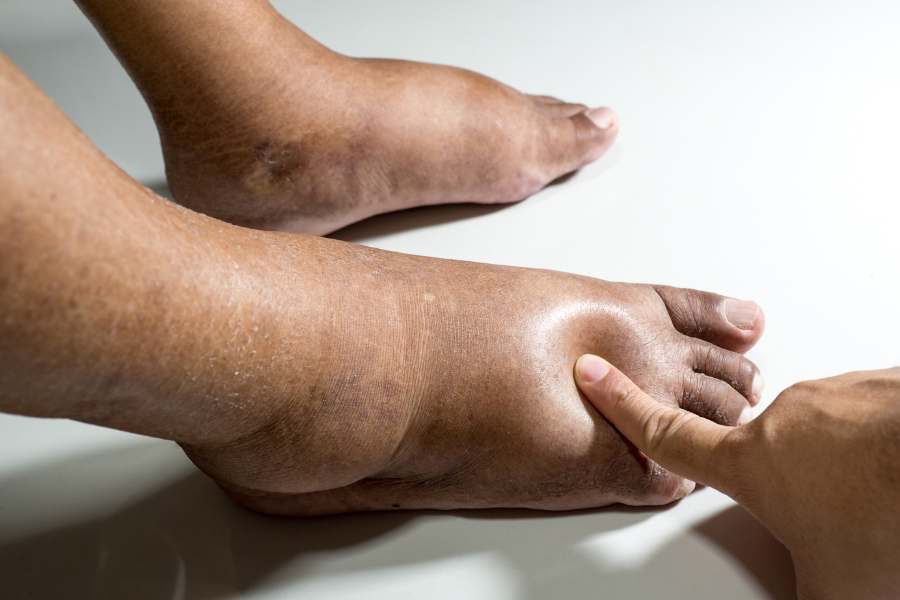Swollen legs can be both a temporary nuisance and a sign of a more serious health issue. Understanding the underlying causes and the available treatment options is crucial in addressing this condition effectively.
What Are Swollen Legs?
Swollen legs, medically known as edema, occur when excess fluid accumulates in the tissues of the lower extremities. This can happen for various reasons, including prolonged standing or sitting, certain medical conditions, and lifestyle factors. It’s important to note that while occasional swelling might not indicate a severe problem, persistent or severe leg swelling requires medical attention.
Common symptoms of swollen legs include a feeling of heaviness, discomfort, and a noticeable puffiness in the feet, ankles, or calves. In some cases, the skin over the swollen area may be stretched and shiny.
Swelling can be generalized or localized, and it might affect both legs or just one. When pressing on the swollen area, it may leave a dent, which is known as pitting edema.
Are Swollen Legs A Sign Of A Serious Problem?
While swollen legs can result from benign conditions such as excessive salt intake or premenstrual syndrome, they can also signify more severe health problems. Conditions like heart failure, kidney disease, or deep vein thrombosis (DVT) can manifest as leg swelling, making it crucial to monitor the condition closely.
If swollen legs are accompanied by symptoms like chest pain, difficulty breathing, or a sudden escalation in swelling, it is critical to seek immediate medical care as these may indicate a life-threatening condition.
What Causes Swollen Legs?
Several factors can lead to swollen legs. One of the most common causes is fluid retention, where the body holds onto excess fluid that then accumulates in the legs. Other reasons include:
- Injuries and inflammation from sprains or strains
- Chronic conditions such as liver disease, kidney disease, or heart failure
- Side effects of medications such as steroids or blood pressure drugs
- Pregnancy, due to the increased pressure on the veins in the legs
- Extended periods of immobility, which can lead to poor circulation
How Are Swollen Legs Diagnosed And Treated?
To diagnose the cause of leg swelling, a medical professional will typically conduct a physical examination, review the patient’s medical history, and may order imaging tests. Treatment for swollen legs will depend on the underlying cause. It may include lifestyle changes such as reducing salt intake, increasing physical activity, or wearing compression stockings to help promote circulation.
In certain cases, medications to manage conditions like high blood pressure or diabetes can help alleviate leg swelling. For more severe cases, treatment might involve addressing specific medical conditions such as heart or kidney disease.
How Can Swollen Legs Be Prevented?
The prevention of leg swelling involves a combination of lifestyle adjustments and proactive health management. Maintaining a healthy weight, staying active, and avoiding long periods of sitting or standing can help reduce the risk of developing swollen legs.
- Exercising regularly to promote circulation
- Wearing comfortable shoes and avoiding tight clothing
- Keeping hydrated but monitoring fluid intake if you have a condition that warrants it
- Elevating the legs when resting to encourage fluid movement
What Is The Best Treatment For Swollen Legs?
The most effective treatment for swollen legs will vary depending on the individual and the underlying cause. However, general strategies like reducing sodium intake, increasing water consumption, and using compression stockings can offer relief for many people.
For those with medical conditions such as heart or kidney disease, managing the primary illness is key to reducing leg swelling. In some cases, surgery may be necessary to treat varicose veins or other circulatory issues.
When Should I Consult A Doctor For Swollen Legs?
It is essential to consult a doctor for swollen legs if you experience severe, sudden swelling, especially when it’s accompanied by other symptoms like chest pain or shortness of breath. Additionally, if the swelling persists or is recurrent, medical advice should be sought to rule out serious conditions.
Now, let’s address some related queries that you might find useful:
Frequently Asked Questions About Leg Swelling
What Kind of Doctor Treats Swollen Legs?
For swollen legs, you may first consult your primary care physician, who could then refer you to a specialist depending on the cause. A vascular surgeon often treats issues related to leg swelling, especially if it’s related to blood flow problems.
Other specialists that might be involved include cardiologists for heart-related swelling, nephrologists for kidney-related issues, and endocrinologists for hormonal imbalances.
What Is The Best Treatment For Swollen Lower Legs?
The best treatment will depend on the diagnosis but may include lifestyle changes, medications to treat underlying conditions, or compression therapy. Elevating the legs and regular exercise are often recommended for managing symptoms.
Which Doctor To See For Swollen Feet?
Initially, you might see your primary care doctor for swollen feet. They can provide a preliminary assessment and then possibly refer you to a podiatrist or another specialist for further treatment.
Which Doctor To Consult For Leg Pain And Swelling?
For leg pain and swelling, you would initially consult your primary care physician. Depending on the findings, you may be referred to a rheumatologist for inflammatory conditions, an orthopedist for musculoskeletal issues, or a vascular surgeon for circulatory problems.
Understanding the causes, symptoms, and treatment options for swollen legs is crucial for timely and effective management of this condition. Remember, while some causes are benign and easily managed, others may require specialist care.
For a deeper understanding, let’s take a look at a relevant video from the carousel provided:
In conclusion, if you’re experiencing persistent or severe swelling, do not hesitate to seek medical advice. With the right treatment and preventive measures, you can manage the symptoms and address any underlying health issues.

